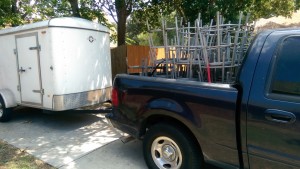Trailer Tires: A Lesson Learned
File this one under “Dad is Learning.” A week ago I was driving home from evening worship service on a local freeway. I was in the truck by myself in the right lane as another truck passed by in the left lane hauling an amazing looking ski boat. Just as the truck passed me the boat trailer began slinging rubber back at me as the tire disintegrated. I hit my hazards and braked to allow the truck to quickly maneuver to the upcoming exit ramp before the tire was completely gone. No harm to anyone but this got me to thinking…
Any regular reader of my blog knows that I buy and sell a lot of items. That means 2 to 3 days a week I am hauling my 5×10 enclosed utility trailer behind my truck. I purchased this trailer in 2006 to use for church activities and for hauling personal items. This trailer has been to New Mexico, Oklahoma, and all across Texas. In all those trips I have given the trailer tires a visual inspection but never took time to educate myself about trailer tires.
Trailer tires and maintenance vary significantly from passenger tires. Tread wear/depth has little to do with the life of a trailer tire since the biggest factor is time. Various manufacturers provide different data for tire replacement, but most say that trailer tires should be replaced every 3 to 5 years irregardless of tire wear. Some manufacturers go as far as giving trailer tires a 7-8 year lifespan. Lack of use is one of the biggest factors in aging a trailer tire.
On most tires, you can determine the manufacture date using the DOT code. The last 4 digits of that code provide you the week and year of manufacture. The first 2 digits are the week, and the next 2 represent the year. Carlisle Tire estimates that trailer tires lose 1/3 of their effectiveness in the first 3 years, whether they are on a trailer or sitting on a shelf.
The best option for most trailer tires will be ST (Special Trailer) classified tires. These tires are generally manufactured to carry more weight and have stiffer sidewalls that can provide greater stability during operation. Use of automotive or light truck tires on a trailer can increase the risk of a blowout since standard tires were not made for the special needs of a trailer.
Since ST tires have strong sidewalls it is possible to have an under inflated tire without even knowing it. The rigid sidewalls that assist in keeping a load stable can also mask a tire that is running low on air. Underinflated tires cannot dissipate heat as well which can lead to sidewall failure and rupture. Checking air pressure with a reliable gauge while the tires are completely cold (not used in 3 hours) is essential. Make sure to inflate the tires to the maximum PSI listed on the sidewall of the tire.
With all that in mind I checked my tires. When I read the code I found out they had been made in 2004. Using an accurate tire gauge I found that my tires were inflated to 35 PSI, when they should be inflated to 50. I was a rolling hazard to myself and to others.
A blow out on my trailer could be very dangerous. The trailer manufacturer made this statement in the manual – “Tire or wheel failure may result in loss of control of the trailer and the towing vehicle, effectually leading to death or serious injury. Trailer tires and wheels are more likely to fail than car tires and wheels because they carry a heavier load.”
Let’s imagine I am pulling my trailer loaded with file cabinets. If a tire were to blow out not only would the trailer shift, but the entire load could shift. The coupler on a trailer may or may not disengage from the tow vehicle and safety chains will most likely keep the trailer attached. It would be best to avoid a wildly flailing payload of 3,000lbs or more.
A few things to keep in mind when buying trailer tires. Make sure to use a company that is familiar with trailer tire installation and axle maintenance. The axles on most trailers need to be greased once a year or every 12,000 miles. Knowledgable tire installers would also make sure to use ST classified tires that are appropriate for the load rating of your trailer and axle.
If you don’t have a trailer, you probably didn’t read to this point in this post. I am sure most trailer owners were already aware of this information but perhaps there were some other owners like me who were unaware of the specifics of proper maintenance for trailer tires. Let’s keep our trailers safe and our loads moving down the road.


I do try to keep my load moving down the road. Probably should have jumped on one of those 3 wheelers you you had and perhaps even lightened that load. 🙂
Pingback: Our Travel Trailer: A Mobile Money Pit - Dad Is Learning
Pingback: When To Replace Trailer Tires | Jons-Cache.com – Hurst, TX